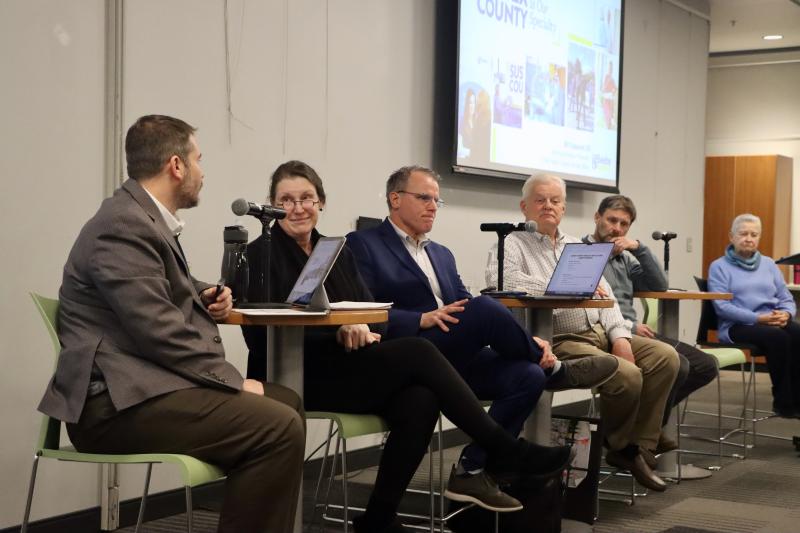Lewes leaders discuss COVID lessons learned

Communication, collaboration, partnerships and listening. Lewes leaders frequently used those words when talking about the lessons learned from the COVID-19 pandemic.
Five community leaders discussed the impact of the pandemic and how their organizations weathered the storm at the Lewes Public Library Jan. 17.
The panelists were Dr. Bill Chasanov, vice president and chief public health officer at Beebe Healthcare; Jen Mason, founder of the Cape Community Coalition; Robert Fulton, superintendent of Cape Henlopen School District; Ted Becker, former Lewes mayor, who was representing the Lewes Chamber of Commerce; and Lewes Mayor Andrew Williams. Former Ambassador Nancy Powell moderated the event.
The leaders all played key roles in navigating a situation that had no playbook.
“The most important thing we accomplished was to provide scientifically based education to the community in a way [people] could understand it,” Chasanov said.
Chasanov said, at one point, Beebe planned to almost double its 210 hospital beds.
He said they quickly learned that as a community resource, Beebe had to listen to what people needed, recognize the importance of behavioral health, and realize partnerships were necessary to succeed.
He said the experience changed the way respiratory season is looked at.
“Now, we talk about flu, we talk about RSV and we talk about COVID,” Chasanov said.
Currently, flu numbers are increasing week-by-week, COVID numbers are remaining steady and RSV should start to drop over the next few weeks.
Chasanov said the first indicator that cases are rising comes from increasing absences in the Cape Henlopen School District.
Fulton said when schools shut down in March 2020, his team had to adapt for a constantly changing situation.
“What I thought would be one of the biggest concerns really wasn’t. That was the academic progress of our students,” Fulton said. “What it turned out to be was feeding our students, and the emotional and mental support for our kids.”
Fulton said in the first 39 days of the shutdown, they delivered more than 56,000 meals to students and their families.
He said one of the best decisions the district made was to get as many kids as safely possible back in the classroom.
“We learned our students were safer in school than at home because of the protocols we followed. Our positive cases were much higher after a break,” Fulton said.
Mason, who launched the Cape Community Coalition during the shutdown in March 2020, said her organization helped people to communicate.
CCC brought together businesses, nonprofits, churches, schools and towns, with 80 partners in all.
“The coalition became a bridge for many agencies and nonprofits statewide to reach their constituents in Sussex County,” Mason said.
“We knew we’d be better at weathering the storm of COVID if we strengthened those ties, making us better to collaborate and coordinate in the future,” Mason said.
But, Mason said, there is work to do before the next emergency.
“We are extremely vulnerable to whatever the next major disaster turns out to be, considering that 75% of our universe lives in unincorporated Sussex County,” Mason said.
She said the county is not staffed to meet response and recovery in those areas.
Becker, who was mayor during the pandemic, used the Love Lewes campaign as an example of how local businesses worked together.
He said that campaign helped get out the word that merchants were open and the city was safe.
Becker also credited the American Legion Post 17 Ladiees Auxiliary with providing ambassadors to help visitors navigate downtown Lewes.
“The ultimate success is that you go downtown today and all the businesses that were there in 2020 are still there,” he said.
Williams echoed the importance of the city working together during the pandemic.
He pointed out that the need to have virtual meetings opened up government to more people.
Williams also said the city has annexed communities, like Donovan-Smith, where English is a second language for some residents. So, he said, the city will have consider that during any future emergency.
“It was an ugly thing we went through socially as a country, but hopefully we’ll come out the other side being more accepting of people’s beliefs to isolate or wear a mask. We can live in a world with parameters that are safe for everyone,” Williams said.


















































